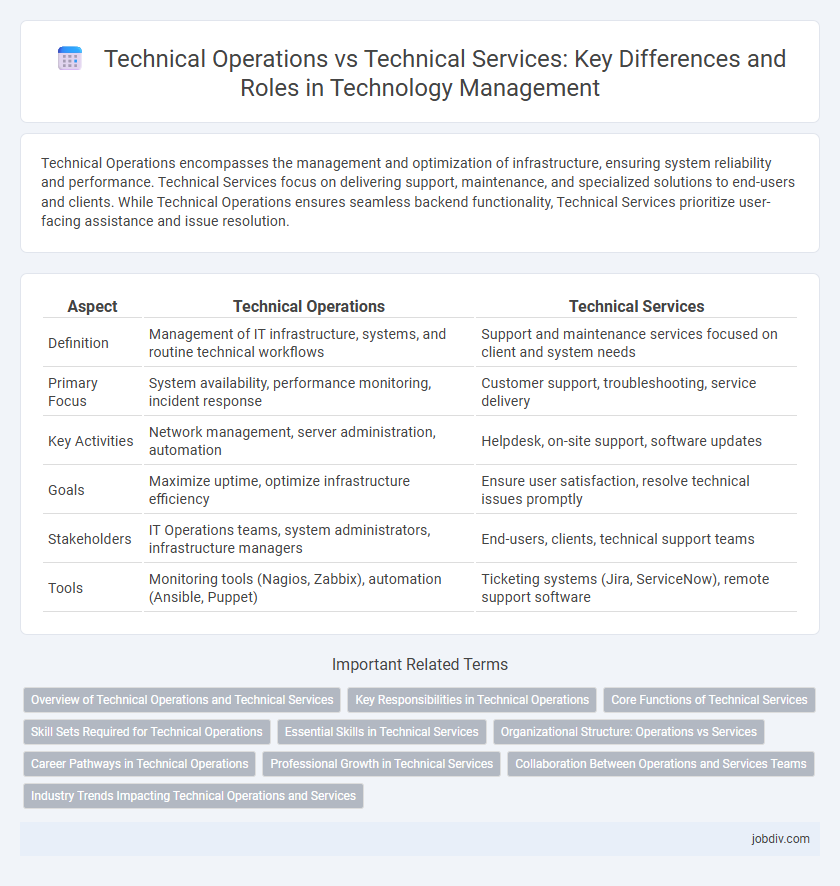Technical Operations encompasses the management and optimization of infrastructure, ensuring system reliability and performance. Technical Services focus on delivering support, maintenance, and specialized solutions to end-users and clients. While Technical Operations ensures seamless backend functionality, Technical Services prioritize user-facing assistance and issue resolution.
Table of Comparison
| Aspect | Technical Operations | Technical Services |
|---|---|---|
| Definition | Management of IT infrastructure, systems, and routine technical workflows | Support and maintenance services focused on client and system needs |
| Primary Focus | System availability, performance monitoring, incident response | Customer support, troubleshooting, service delivery |
| Key Activities | Network management, server administration, automation | Helpdesk, on-site support, software updates |
| Goals | Maximize uptime, optimize infrastructure efficiency | Ensure user satisfaction, resolve technical issues promptly |
| Stakeholders | IT Operations teams, system administrators, infrastructure managers | End-users, clients, technical support teams |
| Tools | Monitoring tools (Nagios, Zabbix), automation (Ansible, Puppet) | Ticketing systems (Jira, ServiceNow), remote support software |
Overview of Technical Operations and Technical Services
Technical Operations encompass the management and maintenance of IT infrastructure, ensuring system stability, performance, and security through monitoring, incident response, and problem resolution. Technical Services focus on delivering support functions such as software installation, configuration, system integration, and user training to optimize technology use. Both areas collaborate to enhance operational efficiency and maintain seamless technology environments within organizations.
Key Responsibilities in Technical Operations
Key responsibilities in Technical Operations include managing infrastructure stability, optimizing system performance, and ensuring seamless integration of hardware and software components. This function entails continuous monitoring, incident response, and proactive maintenance to minimize downtime and enhance reliability. Technical Operations also oversee capacity planning and scalability to support evolving business requirements while maintaining compliance with industry standards.
Core Functions of Technical Services
Technical Services primarily focus on core functions such as system maintenance, troubleshooting, and user support, ensuring operational efficiency and minimal downtime. They manage software updates, hardware repairs, and technical documentation to maintain service quality. Technical Operations, by contrast, oversee broader infrastructure management, coordinating cross-functional teams to optimize workflow and resources.
Skill Sets Required for Technical Operations
Technical Operations require proficiency in network management, system administration, and real-time monitoring to ensure infrastructure stability and performance. Skills in automation tools, incident response, and infrastructure as code are essential to streamline workflows and reduce downtime. Expertise in troubleshooting complex system issues and knowledge of security protocols are critical for maintaining operational integrity.
Essential Skills in Technical Services
Essential skills in Technical Services include strong problem-solving abilities, proficient communication skills for effective client interaction, and in-depth technical knowledge across relevant systems and software. Expertise in troubleshooting, system maintenance, and user support ensures optimal performance and minimal downtime. Mastery of these skills enables Technical Services teams to deliver timely solutions and maintain high service quality.
Organizational Structure: Operations vs Services
Technical Operations typically emphasize the management of infrastructure, system maintenance, and real-time monitoring within a centralized organizational structure to ensure system stability and uptime. In contrast, Technical Services focus on delivering client-centric solutions, support, and customizations through a more decentralized, team-oriented structure designed to enhance customer satisfaction and adaptability. The operational model for Technical Operations centers on efficiency and standardization, while Technical Services prioritize flexibility and direct client engagement within their organizational frameworks.
Career Pathways in Technical Operations
Career pathways in Technical Operations emphasize roles involving system maintenance, network management, and infrastructure support, ensuring optimal performance and reliability. Professionals in Technical Operations typically advance from entry-level technicians to senior operations managers, specializing in process optimization and incident resolution. Mastery of automation tools, cloud technologies, and monitoring systems is critical for progression within this dynamic field.
Professional Growth in Technical Services
Technical Services offers greater opportunities for professional growth through hands-on problem-solving, continuous skill development, and client interaction, which enhances both technical expertise and communication abilities. Unlike Technical Operations, which primarily focuses on maintaining system stability and routine processes, Technical Services drives innovation by addressing complex technical challenges and implementing customized solutions. This dynamic environment fosters career advancement by encouraging certifications, cross-functional collaboration, and exposure to cutting-edge technologies.
Collaboration Between Operations and Services Teams
Collaboration between Technical Operations and Technical Services teams enhances system reliability and accelerates issue resolution by streamlining communication and aligning objectives. Integrated workflows leverage Operations' infrastructure management expertise with Services' specialized support knowledge, fostering proactive problem-solving and efficient incident response. Cross-functional collaboration tools and unified reporting mechanisms further optimize performance monitoring and customer satisfaction outcomes.
Industry Trends Impacting Technical Operations and Services
Industry trends such as automation, artificial intelligence, and the Internet of Things (IoT) are driving significant transformations in Technical Operations and Technical Services, enabling real-time monitoring, predictive maintenance, and enhanced operational efficiency. The shift towards cloud computing and edge technologies is facilitating faster deployment and scalability of technical services while optimizing resource utilization in operations. Emphasis on cybersecurity and data analytics is intensifying to address growing vulnerabilities and extract actionable insights, ensuring robust and resilient technical infrastructures.
Technical Operations vs Technical Services Infographic

 jobdiv.com
jobdiv.com